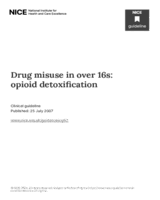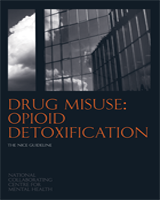All rights reserved. No part of this book may be reprinted or reproduced or utilised in any form or by any electronic, mechanical, or other means, now known or hereafter invented, including photocopying and recording, or in any information storage or retrieval system, without permission in writing from the publishers. Enquiries in this regard should be directed to the British Psychological Society.
NCBI Bookshelf. A service of the National Library of Medicine, National Institutes of Health.
This publication is provided for historical reference only and the information may be out of date.
The guideline on Drug misuse: opioid detoxification, commissioned by NICE and developed by the National Collaborating Centre for Mental Health, sets out clear, evidence-based recommendations for healthcare staff on how to work with people who misuse opioids to significantly improve their treatment and care, and to deliver detoxification safely and effectively. Of the estimated 4 million people in the UK who use illicit drugs each year, approximately 50,000 misuse opioids (such as heroin, opium, morphine, codeine and methadone). Opioid misuse presents a considerable health risk and can lead to significant social problems. This NICE guideline is an important tool in helping people to overcome their drug problem.
This publication brings together all of the evidence that led to the recommendations in the NICE guideline. It provides an overview of drug misuse and opioid detoxification and covers assessment and testing, pharmacological and physical interventions used in detoxification, psychosocial interventions to support detoxification, and the settings in which the treatment can take place. The book is illustrated by the experiences of people who have been dependent on opioids, and there is also advice for family members and carers of people with a drug problem.
Contents
- GUIDELINE DEVELOPMENT GROUP MEMBERS
- ACKNOWLEDGEMENTS
- 1. EXECUTIVE SUMMARY
- 2. INTRODUCTION
- 3. INTRODUCTION TO DRUG MISUSE
- 3.1. DRUG MISUSE AND OPIOID DEPENDENCE
- 3.2. EPIDEMIOLOGY OF DRUG MISUSE
- 3.3. AETIOLOGY AND MAINTENANCE OF DRUG MISUSE
- 3.4. THE COURSE OF DRUG MISUSE
- 3.5. THE PHARMACOLOGY OF OPIOIDS
- 3.6. THE PUBLIC HEALTH IMPACT OF DRUG MISUSE
- 3.7. IDENTIFICATION AND ASSESSMENT OF DRUG MISUSE
- 3.8. THE AIMS OF THE TREATMENT AND MANAGEMENT OF DRUG MISUSE
- 3.9. THE DEVELOPMENT OF DETOXIFICATION SERVICES
- 3.10. CURRENT CARE AND TREATMENT IN THE NHS
- 3.11. THE EXPERIENCE OF DRUG MISUSE – PERSONAL PERSPECTIVES
- 3.12. IMPACT OF DRUG MISUSE ON FAMILIES AND CARERS
- 3.13. ECONOMIC IMPACT OF DRUG MISUSE
- 4. METHODS USED TO DEVELOP THIS GUIDELINE
- 5. ASSESSMENT AND TESTING
- 6. PHARMACOLOGICAL AND PHYSICAL INTERVENTIONS IN OPIOID DETOXIFICATION
- 6.1. INTRODUCTION
- 6.2. PHARMACOLOGICAL INTERVENTIONS IN DETOXIFICATION
- 6.3. OVERALL CLINICAL SUMMARY OF PHARMACOLOGICAL INTERVENTIONS IN DETOXIFICATION
- 6.4. CLINICAL PRACTICE RECOMMENDATIONS
- 6.5. ULTRA-RAPID, RAPID AND ACCELERATED DETOXIFICATION USING OPIOID ANTAGONISTS
- 6.6. CLINICAL PRACTICE RECOMMENDATIONS
- 6.7. PHYSICAL AND COMPLEMENTARY INTERVENTIONS DURING DETOXIFICATION
- 7. PSYCHOSOCIAL INTERVENTIONS IN OPIOID DETOXIFICATION
- 7.1. INTRODUCTION
- 7.2. CURRENT PRACTICE
- 7.3. DEFINITIONS
- 7.4. OUTCOMES
- 7.5. DATABASES SEARCHED AND INCLUSION/EXCLUSION CRITERIA
- 7.6. STUDIES CONSIDERED
- 7.7. PSYCHOSOCIAL INTERVENTIONS IN COMBINATION WITH DETOXIFICATION
- 7.8. CLINICAL SUMMARY
- 7.9. LITERATURE REVIEW OF HEALTH ECONOMICS EVIDENCE
- 7.10. ECONOMIC MODELLING
- 7.11. CLINICAL PRACTICE RECOMMENDATIONS
- 8. SETTINGS FOR OPIOID DETOXIFICATION
- 9. APPENDICES
- APPENDIX 1. SCOPE FOR THE DEVELOPMENT OF THE CLINICAL GUIDELINE
- APPENDIX 2. DECLARATIONS OF INTEREST BY GUIDELINE DEVELOPMENT GROUP MEMBERS
- APPENDIX 3. SPECIAL ADVISORS TO THE GUIDELINE DEVELOPMENT GROUP
- APPENDIX 4. STAKEHOLDERS WHO RESPONDED TO EARLY REQUESTS FOR EVIDENCE
- APPENDIX 5. STAKEHOLDERS AND EXPERTS WHO SUBMITTED COMMENTS IN RESPONSE TO THE CONSULTATION DRAFT OF THE GUIDELINE
- APPENDIX 6. RESEARCHERS CONTACTED TO REQUEST INFORMATION ABOUT UNPUBLISHED OR SOON-TO-BE PUBLISHED STUDIES
- APPENDIX 7. CLINICAL QUESTIONS
- APPENDIX 8. SEARCH STRATEGIES FOR THE IDENTIFICATION OF CLINICAL STUDIES
- APPENDIX 9. CLINICAL STUDY DATA EXTRACTION FORM
- APPENDIX 10. QUALITY CHECKLISTS FOR CLINICAL STUDIES AND REVIEWS
- APPENDIX 11. SEARCH STRATEGIES FOR THE IDENTIFICATION OF HEALTH ECONOMICS EVIDENCE
- APPENDIX 12. QUALITY CHECKLISTS FOR ECONOMIC STUDIES
- APPENDIX 13. DATA EXTRACTION FORM FOR ECONOMIC STUDIES
- APPENDIX 14. EVIDENCE TABLES FOR ECONOMIC STUDIES
- APPENDIX 15. CHARACTERISTICS OF REVIEWED STUDIES
- APPENDIX 16. CLINICAL EVIDENCE FOREST PLOTS
- APPENDIX 17. EVIDENCE PROFILE TABLES
- 10. GLOSSARY
- 11. REFERENCES
- 12. ABBREVIATIONS
- NLM CatalogRelated NLM Catalog Entries
- Review Antisocial Personality Disorder: Treatment, Management and Prevention[ 2010]Review Antisocial Personality Disorder: Treatment, Management and PreventionNational Collaborating Centre for Mental Health (UK). 2010
- Review Depression in Adults with a Chronic Physical Health Problem: Treatment and Management[ 2010]Review Depression in Adults with a Chronic Physical Health Problem: Treatment and ManagementNational Collaborating Centre for Mental Health (UK). 2010
- Predictors for completing an inpatient detoxification program among intravenous heroin users, methadone substituted and codeine substituted patients.[Drug Alcohol Depend. 2001]Predictors for completing an inpatient detoxification program among intravenous heroin users, methadone substituted and codeine substituted patients.Backmund M, Meyer K, Eichenlaub D, Schütz CG. Drug Alcohol Depend. 2001 Oct 1; 64(2):173-80.
- Review Palliative care for adults: strong opioids for pain relief[ 2016]Review Palliative care for adults: strong opioids for pain relief. 2016 Aug
- Review Borderline Personality Disorder: Treatment and Management[ 2009]Review Borderline Personality Disorder: Treatment and ManagementNational Collaborating Centre for Mental Health (UK). 2009


